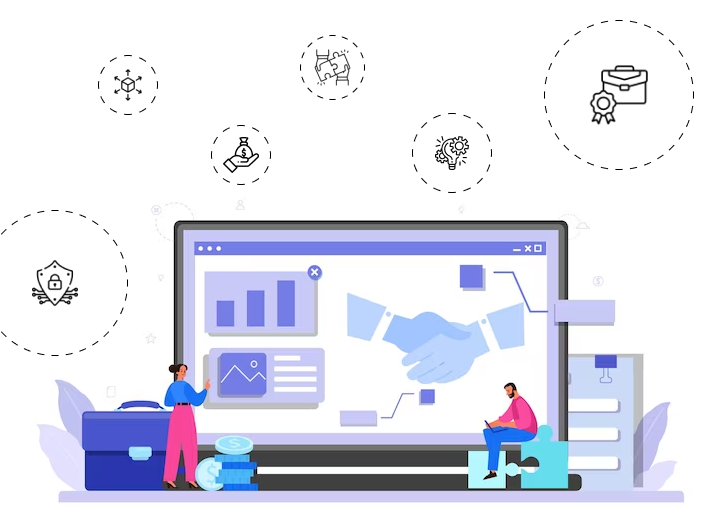B2B sector comprises businesses that create products and services specifically for other businesses. This article explores the advantages of custom software development within the B2B context.
MailChimp and Salesforce are examples of prominent B2B businesses. MailChimp, a leading marketing automation platform, assists various B2B enterprises, from small e-commerce shops to large online retailers, in engaging with their audiences and building their brands. Salesforce offers cloud-based applications to other businesses. It is essential for B2B organizations to create and implement software solutions that match their unique requirements because the B2B industry has seen substantial expansion in recent years.
Role of Custom Software Solutions in B2B Businesses
According to Forbes, technology plays a vital role in helping leaders understand data and provide personalized offers and experiences to customers. Service standards have become a distinguishing factor for customers when choosing a brand. Leveraging technology to achieve customer-centric goals can revolutionize B2B businesses.
Custom B2B software applications are tailored to optimize various aspects of a business, including marketing, resource planning, e-commerce, customer relationships, accounting and payroll, inside sales, data storage, management, and analytics, among others. Over time, B2B businesses have realized that off-the-shelf software products often fall short in meeting diverse buyer needs. This realization has fueled the demand for custom software development, which addresses the specific requirements of each organization.

Benefits of Custom Software Solutions
The benefits of custom-developed software continue to evolve through innovation in B2B applications. The following sections outline the core advantages of custom software development.
1- Technological Innovation
While different backend programming languages exist, such as JavaScript, Python, Ruby, Swift, and C++, the appearance and usability of the software interface are crucial. Custom software allows B2B businesses to effectively leverage advancements in technology by incorporating new programming languages, toolkits, and improved existing technologies. It enables the creation of tools capable of managing large amounts of information or integrating multiple unrelated processes.
2- Addressing Unique B2B Features
While there may be similarities in business structure and processes among B2B entities, not all businesses are entirely alike. Building custom software from scratch ensures that it suits the unique business model and operations of a company. It also allows the incorporation of specific branding and design, providing users—whether internal employees or customers—with an exclusive and exceptional experience.
3- Versatility and Scalability
As businesses grow, processes become more complex, necessitating changes in the working model. New positions and departments may be added, requiring adjustments to accommodate these changes. To facilitate growth, businesses should invest in flexible, custom software designed with an evolving business framework in mind. This approach enables the business to respond to industry changes and leverage technological advancements without waiting for software updates, ensuring uninterrupted operations.
4- Enhanced Security
Nearly every business stores data online, making data breaches a significant concern. The impact of a breach can range from the loss of trust with clients to operational setbacks. Regardless of the software in use, businesses must consider both internal and external security protocols. Depending on the sensitivity of the business data, there may be legal requirements and industry standards to meet. Custom B2B software allows businesses to restrict user access and implement gate content, providing a level of flexibility often unavailable in pre-packaged software.
5- Cost-effectiveness
Software-as-a-service (SaaS) products may appear less expensive at first due to upfront costs, but they frequently have monthly or annual subscription fees, maintenance costs, and extra expenditures for support or greater storage limitations. While custom software may have greater up-front expenses, it gives organizations complete ownership and control over the user experience, features, and capabilities.
6- Seamless Integration
Businesses often rely on multiple software programs to operate optimally. However, incorporating software that does not seamlessly fit into the existing technical environment can become burdensome. Custom software can be tailored to integrate smoothly with other key applications used within the business. During its development, compatibility with existing applications is considered from the outset, eliminating the need for patchwork architecture.
Conclusion
Building a custom-developed software environment empowers businesses to integrate the advantages of custom software development, ensuring the seamless flow of information without obstacles or workarounds. Selecting the right B2B custom software development partner depends on factors such as work quality, technical expertise, support services, and their ability to understand the unique aspects of your business.